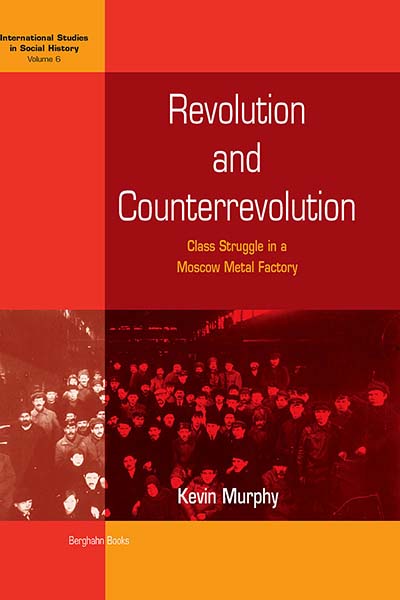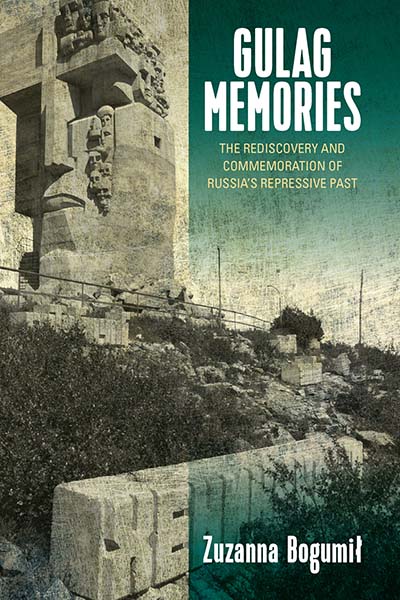
Series
Volume 6
International Studies in Social History
See Related
History JournalsEmail Newsletters
Sign up for our email newsletters to get customized updates on new Berghahn publications.
Revolution and Counterrevolution
Class Struggle in a Moscow Metal Factory
Kevin Murphy
252 pages, bibliog., index
ISBN 978-1-57181-429-6 $135.00/£104.00 / Hb / Published (April 2005)
eISBN 978-1-78533-489-4 eBook
Winner: 2005 Isaac and Tamara Deutscher Memorial Prize
Reviews
"Kevin Murphy has written an important book. It steers a course between the prevailing historical orthodoxy that dismisses the Russian Revolution of October 1917 as a disastrous aberration and the so-called 'revisionists' who have portrayed Stalinism as a phenomenon with strong popular roots." · Alex Callinicos, Professor of European Studies, King's College London and member of Isaac and Tamara Deutscher Memorial Prize Committee
“…a fine study…that is meticulously researched and consistently stimulating – and one that offers an interesting worm’s-eye view of what the Revolution meant to working people.” · Journal of Modern History
“Kevin Murphy has produced an outstanding and original work that is a must-read for all those interested in Soviet history…The judges of the annual Isaac and Tamara Deutscher Memorial Prize have fittingly chosen this book as their winner for 2005, for which they deserve congratulations.” · Capital and Class
"Murphy draws on an abundant, varied, and multilayered documentary evidence…a tremendous contribution…we all stand in his debt." · New Politics
"The workers of the Hammer and Sickle factory come alive here in an exciting story of struggle, victory, and defeat. Their voices ring out to us across the years, as we join them in their meetings and on the shop floor, at the height of revolutionary hopes and the defeats of the Stalin years. Murphy offers an unprecedented view of dissent and accommodation at the grassroots level." · Wendy Goldman, Carnegie Mellon University
"Murphy has given us an impeccably researched case study of the vicissitudes of workers politics on the shop floor, which charts the rise and fall of worker activism....This is not a monolithic working class of revolutionary heroes or atomized victims, but a politically and ideologically diverse and contradictory group whose daily struggles and internal battles Murphy charts with subtlety and precision." · Donald Filtzer, University of East London, UK
"Kevin Murphy's brilliant new study offers fresh insights into how the political struggle in Russia reverberated in the factories before, during, and after 1917. Significantly, it illuminates the many ways in which Stalinism was asserted on the shop floor." · Andrei Sokolov, The Institute of Russian History, Russian Academy of Sciences
"The archives have been open now for fifteen years and few historians of revolutionary Russia have tested previously held assumptions and interpretations of the past through systematic studies of primary source material as Murphy has achieved in this study. · The Russian Review
“This book adds much to the literature on workers in Soviet Russia after the October Revolution. ….[it] illustrates the challenges of regarding the working class as a single entity and the value of close regional or micro-study to further develop and nuance general historical understanding of the Soviet Union.” · Left History
Description
Why did the most unruly proletariat of the Twentieth Century come to tolerate the ascendancy of a political and economic system that, by every conceivable measure, proved antagonistic to working-class interests? Revolution and Counterrevolution is at the center of the ongoing discussion about class identities, the Russian Revolution, and early Soviet industrial relations. Based on exhaustive research in four factory-specific archives, it is unquestionably the most thorough investigation to date on working-class life during the revolutionary era. Focusing on class conflict and workers' frequently changing response to management and state labor policies, the study also meticulously reconstructs everyday life: from leisure activities to domestic issues, the changing role of women, and popular religious belief. Its unparalleled immersion in an exceptional variety of sources at the factory level and its direct engagement with the major interpretive questions about the formation of the Stalinist system will force scholars to re-evaluate long-held assumptions about early Soviet society.
Kevin Murphy teaches history at the University of Massachusetts, Boston. His current writing projects include A People’s History of the Russian Revolution and a study of the role of trade unions in Soviet society.


